September 2013 Welcome to Issue 37 of the SUPERIOR BOOK PRODUCTIONS newsletter! Summer is ending and I'm looking forward to the slow bookselling season between summer and the holidays. This is a great time to get caught up on my writing and my reading. People often ask me how much time I spend writing. The answer is usually only about an hour a day. The rest of the time I spend editing books for others and reading, both of which are also good teachers of writing, and as a writer, I am always seeking to learn to write better. I can't overemphasize the importance of reading for writers—and of reading great books. People often assume I majored in creative writing in college, but I actually majored in literature because I wanted to learn from the master novelists: Jane Austen, Charles Dickens, Nathaniel Hawthorne, Anthony Trollope, George Eliot, E.M. Forster, Virginia Woolf, John Galsworthy, and the list goes on. No matter what you want to write, you need to read the classics in your field. If you're writing fiction, start with the authors I named. If you're writing self-help, start with classics like Napoleon Hill's Think and Grow Rich or Norman Vincent Peale's The Power of Positive Thinking. If you're writing business books, read business books. If you're writing history, read other great history books. Learn from the masters. But don't be afraid to read bad books as well. Just read them to figure out why they aren't very good and how, if you were to rewrite the book, you would make it better. Reading is just as important as actual writing for mastering the craft. I challenge you to read at least a book a week, or 50-100 pages a day. It's work, but it's fun. Go for it! You'll be surprised how your writing will improve. Be sure to check out the latest great new books below, and thank you, as always, for reading the Superior Book Productions newsletter. Tyler R. Tichelaar |
New Books |
To read more, visit Trollope on the Net.
|
To read more, visit Ordinary Reflections.
|
The story begins when Marianne Campagna's Chinese father is a student in Germany during the 1930s. As Hitler rises to power, her father falls in love with her German mother, and because interracial marriages are forbidden under the Nazi regime, they must flee the country as World War II breaks out. This book will take young Marianne, born in China, to Brazil, the United States, and back to China. You will never forget this book! To read more, visit Reflections from Gavea.
|
To read more, visit Empowering the Children.
|
I expected Beyond Psychology to be a book about how to move oneself past traumatic incidents and other issues or events that block people from having normal or happy lives, including traumatic events like car accidents, relationship conflicts, or work-related stress. That information is included in great detail in the last section of the book, but first Gerbode takes the reader on an extensive tour of how the mind operates, how a person conceives of reality, and what is true for the individual according to his personal experiences. To read more, visit Beyond Psychology.
|
Want to be an editor yourself? Check out:

The Nomad Editor
Tyler R.
Tichelaar,
PhD
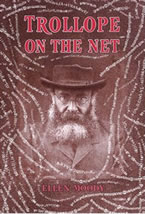 Since Anthony Trollope currently is my favorite novelist and a big influence on my writing, let's begin with Ellen Moody's Trollope on the Net, a truly pioneering work on the ways the Internet has changed how we read and talk about books, using Anthony Trollope as her subject. While anyone who loves Trollope's novels will enjoy this book for its extensive commentary on his novels, Moody's focus is also on how book discussions are held and how they inform our reading. Moody discusses the establishment of the Trollope and His Contemporaries list-serv discussion group (of which I'm a longtime member) in the late 1990s and how the group came to read together and discuss Trollope's novels. She describes in detail the demographics of the readers involved in the list, the housekeeping of how participants voted and decided on which books to read, and the discussions of the books, along with what disagreements ensued, when participation was slow or active and why, and what was to be gained in terms of better understanding Trollope through reading as an online group.
Since Anthony Trollope currently is my favorite novelist and a big influence on my writing, let's begin with Ellen Moody's Trollope on the Net, a truly pioneering work on the ways the Internet has changed how we read and talk about books, using Anthony Trollope as her subject. While anyone who loves Trollope's novels will enjoy this book for its extensive commentary on his novels, Moody's focus is also on how book discussions are held and how they inform our reading. Moody discusses the establishment of the Trollope and His Contemporaries list-serv discussion group (of which I'm a longtime member) in the late 1990s and how the group came to read together and discuss Trollope's novels. She describes in detail the demographics of the readers involved in the list, the housekeeping of how participants voted and decided on which books to read, and the discussions of the books, along with what disagreements ensued, when participation was slow or active and why, and what was to be gained in terms of better understanding Trollope through reading as an online group.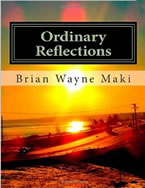 Although Brian Wayne Maki has titled this new volume of poetry Ordinary Reflections, I find many of the poems to be quite poignant. I appreciate that he follows William Wordsworth's dictate that a poet should be a “man speaking to men,” perhaps with more sensitivity and joy for life than others, but nevertheless, speaking in their language. In other words, Maki writes what might be considered, even by him, ordinary poems, poems not filled with images that act like puzzles that distract the reader from the meaning. His words and subjects are straightforward and reflect those special, far from ordinary, moments when we most reflect on life. In fact, he makes us realize that our lives are filled with meaningful and poetic moments, even if we do not turn them into poetry ourselves.
Although Brian Wayne Maki has titled this new volume of poetry Ordinary Reflections, I find many of the poems to be quite poignant. I appreciate that he follows William Wordsworth's dictate that a poet should be a “man speaking to men,” perhaps with more sensitivity and joy for life than others, but nevertheless, speaking in their language. In other words, Maki writes what might be considered, even by him, ordinary poems, poems not filled with images that act like puzzles that distract the reader from the meaning. His words and subjects are straightforward and reflect those special, far from ordinary, moments when we most reflect on life. In fact, he makes us realize that our lives are filled with meaningful and poetic moments, even if we do not turn them into poetry ourselves.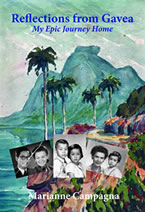 When I finished reading Reflections from Gavea, all I could think was “WOW! WOW! WOW! What a book!” Encompassed within the story of Marianne Campagna's personal story of her separation from her father and brother and her reconnection with them is most of the history of the twentieth century and the four continents of Europe, Asia, North America, and South America. I have never read a book like this memoir, and the most amazing part is that this epic story is all true.
When I finished reading Reflections from Gavea, all I could think was “WOW! WOW! WOW! What a book!” Encompassed within the story of Marianne Campagna's personal story of her separation from her father and brother and her reconnection with them is most of the history of the twentieth century and the four continents of Europe, Asia, North America, and South America. I have never read a book like this memoir, and the most amazing part is that this epic story is all true.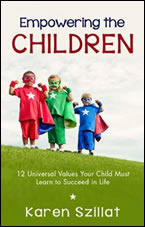 Preschool sure has changed. And Karen Szillat is helping to lead that change so today's preschoolers can grow into tomorrow's caring and informed adults. I thought preschoolers learned colors, played in the sandbox, and maybe had a book read to them, but Karen Szillat learned early on as a babysitter how soon in life children learn to imitate adults, and she has taken advantage of that knowledge in her Early Childhood Education career to teach children how to grow up questioning the world around them and caring about others in that world. What the children in her classes have learned has not only amazed me, but I think it will amaze every parent, teacher, grandparent, and childcare provider, all of whom need to read this book.
Preschool sure has changed. And Karen Szillat is helping to lead that change so today's preschoolers can grow into tomorrow's caring and informed adults. I thought preschoolers learned colors, played in the sandbox, and maybe had a book read to them, but Karen Szillat learned early on as a babysitter how soon in life children learn to imitate adults, and she has taken advantage of that knowledge in her Early Childhood Education career to teach children how to grow up questioning the world around them and caring about others in that world. What the children in her classes have learned has not only amazed me, but I think it will amaze every parent, teacher, grandparent, and childcare provider, all of whom need to read this book.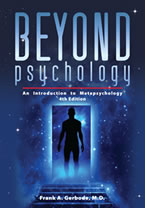 Frank Gerbode's Beyond Psychology is the fourth edition of the original book published in 1988, and hence, a sort of twenty-fifth anniversary edition that is a testament to the power of metapsychology.
Frank Gerbode's Beyond Psychology is the fourth edition of the original book published in 1988, and hence, a sort of twenty-fifth anniversary edition that is a testament to the power of metapsychology.